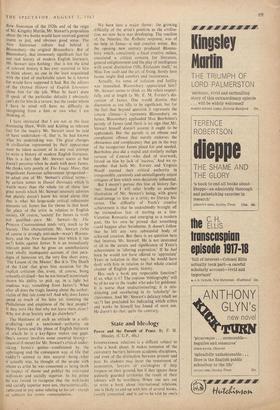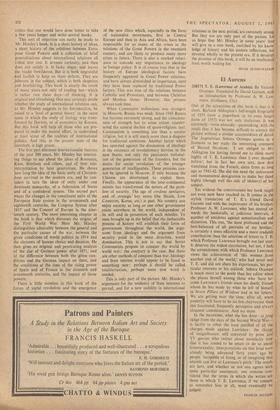State and Ideology
Power and the Pursuit of Peace. By F. H. Hinsley. (C U.P., 40s.) INTERNATIONAL relations is a difficult subject to write a book about. It makes nonsense of the customary barriers between academic disciplines, and even of the distinction between present and past. Its students May incur the resentment of economists, lawyers or sociologists if • they trespass on their ground, but if they ignore these jealously guarded territories the result of their labours will be worthle,s. When one sets out to write a book about international relations, one is likely to end up with bits of several books, • loosely connected, and is apt to be told by one's
critics that one would have done better to take a few years longer and write several books.
This sort of objection can easily be made to Mr. Hinsley's book. It is a short history of ideas, a short history of the relations between Euro- pean Great Powers and a collection of brief generalisations about international relations all rolled into one. It arouses curiosity, and then does not satisfy it. It lacks shape, and leaves the reader bewildered. But it is both ungrateful and foolish to harp on these defects. They are inherent in the subject, which is both shapeless and bewildering. This book is clearly the result of many years not only of reading but—which is rather rare these days—of thinking. It is original and stimulating. One may seriously doubt whether the study of international relations can, as Mr. Hinsley suggests in his Introduction, be raised to a 'level of general theory' in the same sense in which the study of biology was trans- formed by Darwin, or of economics by Keynes. But this book will help all those who are pre- pared to make the mental effort, to understand at least some of the realities of international politics. And this, in the present state of the literatute, is high praise.
The first part discusses internationalist theories of the past 300 years. Mr. Hinsley has interest- ing things to say about the ideas of Rousseau, Kant, Bentham and others, and of their mis- interpretation by later generations. He shows how long the idea of the basic unity of Christen- dom survived in the modern era, and be con- siders in turn the ideas of unity under one dominant monarchy, of a federation of States and of a confederal system. The second part traces the changes in the constituent units of the European State system in the seventeenth and eighteenth centuries, the Congress System after 1815 and the Concert of Europe in the nine- teenth century. The most interesting chapter in the book is that which discusses the origins of the First World War. Here Mr. Hinsley distinguishes admirably between the general and the particular causes of the war, between the given conditions of world politics in 1914 and the elements of human choice and decision. He then gives an original and penetrating analysis of the rise of German power after 1871, and • of the difference between both the given con- ditions and the German impact on them, and the conditions at the time of the rising power of Spain and of France in the sixteenth and seventeenth centuries, and the impact of those powers. There is little mention in this book of the forces of social revolution and the emergence
of the new elites which, especially in the form of nationalist movements, first in Central Europe and then in Asia and Africa, have been responsible for so many of the crises in the relations of the Great Powers in the twentieth century, and are likely to produce many more crises in future. There is also a marked reluct- ance to concede any importance to ideology in foreign policy. It is of course true that in the history of Europe ideological factors have frequently appeared in Great Power relations, and have always diminished in importance, until they have been replaced by traditional Power factors. This was true of the relations between Catholic and Protestant, and between Christian and Moslem States. However, this process always took time.
When Communist enthusiasm was strongest in Moscow, Russia was weak. Since 1945 Russia has become extremely strong, and the conscious- ness of strength has to some extent counter- acted the natural decline of quasi-religious zeal. Communism is something less than a secular religion, but it is still much more than a disguise for traditional ambitions. Another factor which has operated against the diminution of ideology is the existence of revolutionary fervour in the new States, not only the passionate national- ism of the generation of the founders, but the desire for social revolution of the younger generation of intelligentsia. These passions can- not be ignored in Moscow, if only because the Chinese are determined to exploit them. Finally, the appearance of the inter-continental missile has transformed the nature of the prob- lem of security. The age of cordons sanitaires, and of strategic key areas (the Straits, Low Countries, Korea, etc.) is past. No country can enjoy security as long as one other government exists anywhere in the world, independent of its will and in possession of such missiles. To men brought up in the belief that the ineluctable process of history will establish their form of government throughout the world, the argu- ment ' from ideology and the argument from security point in the same direction, world domination. This is not to say that Soviet Communists propose to conquer the world by world war: the contrary is the case. But there are other methods of conquest than war. Ideology and State interest vvouid appear to be fused in something new: perhaps it should be called totalitarianism, perhaps some new word is needed.
This is only part of the picture. Mr. Hinsley's arguments for the tendency of State interests to prevail, and for a new stability in international relations in the next period, are extremely strong. But they too are only part of the picture. Let us hope that Mr. Hinsley in some years' time will give us a new book, enriched by his know. ledge of history and his austere reflections, but devoted wholly to the present era. If it develops the promise of this book, it will be an intellectual treat worth waiting for.
HUGH SETON-WATSON































 Previous page
Previous page